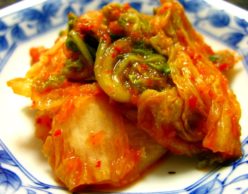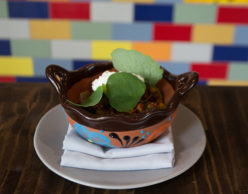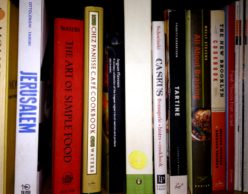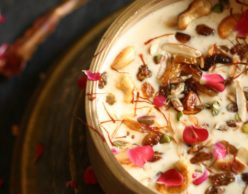Na Young Ma: She Bakes French, Cooks Korean
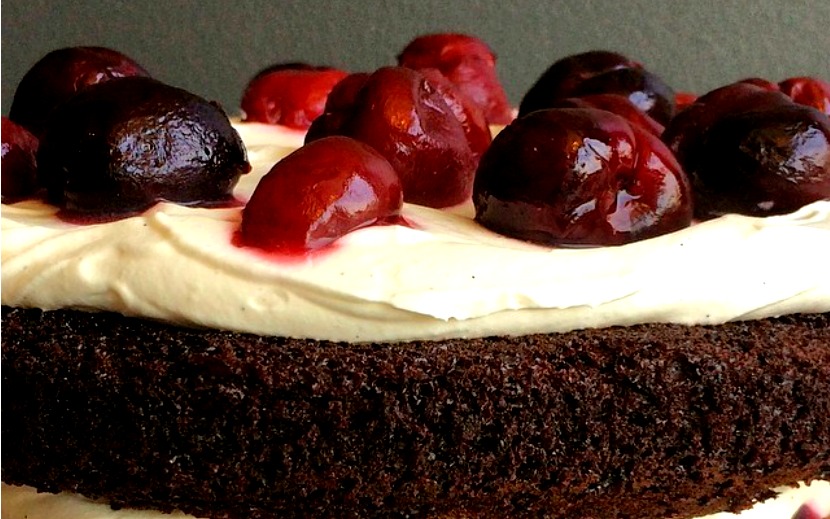
As part of a new series of interviews exploring food and identity, The Mash-Up Americans is talking to chefs, food writers, and industry veterans about why food matters, and why it matters so much.
Today we’re talking to Na Young Ma, the baker and creative perfectionist behind Proof Bakery, in her native Los Angeles. The Korean-born, “1.5-generation” American, who studied art history at Cornell University and learned to bake at the Culinary Institute of America at Greystone, in Napa, makes classic French pastries at Proof, while learning to cook Korean food at home. She also almost named her Mash-Up son “Banchan.” Read on.
Where did you grow up?
I was born in Korea and then we came to the U.S. when I was two. My parents lived in Koreatown in Los Angeles when we first moved here. We moved to Glendale when I was five or six. Glendale was very white and Asian. There were a lot of Koreans there! Now it’s Koreans and Armenians. Kind of your typical L.A. suburb.
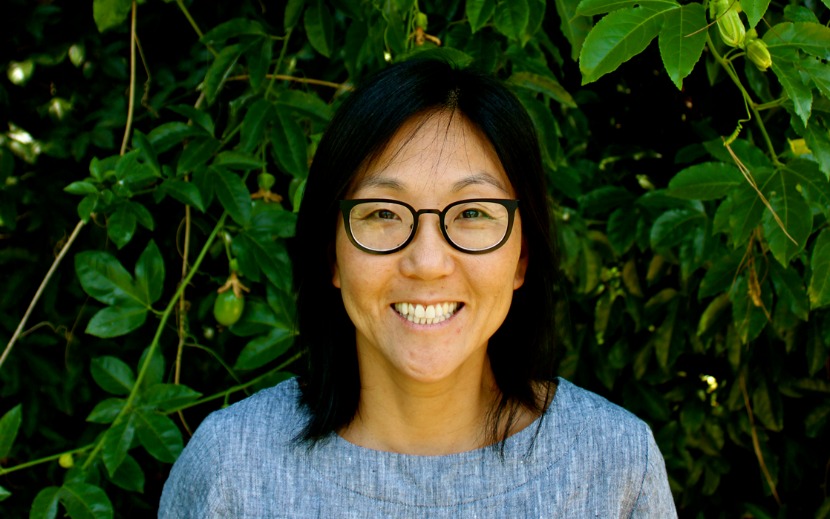
Do you speak Korean?
I do, but not well. Not really well at all. We spoke at home, and mine is better than my sister’s, who is three years younger than me. I would respond to my parents in English or in a mash-up of both Korean and English. And I still do that now with my mom because it seems like her English has gotten worse as she’s gotten older. In college I went to Korea for a summer language program to learn to read and write.
You have a one-year-old biracial son. Do you speak Korean to him?
So here’s the thing. Lately I’ve been really wanting to speak Korean to him but it’s kind of not natural, so I’m forcing myself. My husband, who’s white, really wants to help. We always say mom and dad in Korean: “Umah and Apah.” My husband does it more than me! I’m like “Mommy,” because I forget, but he never does. My mom speaks to my son in Korean, and anytime someone babysits who is older and Korean they do it naturally. Weirdly, my cousin who is a couple years younger than me, knows more Korean than me!
Did she grow up here?
Yes. That’s something I’ve noticed. So I grew up 1.5 generation, [Editor’s note: 1.5 refers to born in Korea, but raised in America.] and she’s a total 2, but all my younger cousins in their 20s for some reason know more Korean than me and my sister.
Do you think it’s because of technology? Korean pop culture?
And they went to Korean school. Another thing that’s interesting is that they are all more religious than we are, so maybe they spoke more Korean through their church community.
Are they all really tall? Amy is so much taller than her older sister, who was born in Korea. Like 40% taller. [Editor’s note: Probably more like 10%.]
My younger sister, who was born here, is definitely taller! I always thought it was just us until I started working in restaurants. At Craft particularly. The young Koreans… like, why are they are all over six feet tall?! I haven’t been to Korea in a while, but even five years ago everyone in Korea was gigantic. Post war nutrition.
What’s your son’s name?
Linus. His middle name is Seojin. We were going call him Banchan as his middle name.
Wait, as in the little plates of snacks served with Korean meals?
Haha. Yes!
And your parents were like, um, no, that’s a food.
Mack, my husband, was like “I love those things and it’s the only Korean name I know!” And I thought it was really cute.
I guess it’s like Gwyneth Paltrow calling her kid Apple.
Exactly. We didn’t, but now I kind of wish I did because Seojin is hard, I’m not going to lie. The “Seo” is hard to pronounce. Mack doesn’t pronounce it correctly and neither do I. There’s a lot of sounds in Korean that are hard to translate. Like a “dt” combined or “pj”.
Is Seojin a family name?
No. We didn’t hyphenate our last names and Mack’s first name is a family name, which his family would have wanted included in Linus’s name. But Linus is not going to take my last name, and he needed to have something of my heritage in there. [Editor’s note: We totally get it.]
Does he look like you?
He looks identical to me and I felt bad in the beginning! My husband would say “he’s exactly half of us” but he looked just like me. If you look at a baby photo of me, we are twins. He’s really cute, but I hate when people say that mixed babies are the cutest. It feels like it’s putting me in my place, even though it’s a positive idea.
That’s like the model minority myth.
Let me be who I can be as an individual. As a woman I don’t want to be placed in a certain role. I’m small and I have a bakery, isn’t that cute? No! I’m a business owner! It’s not cute, I make things happen. It’s pretty constant.
Is being a woman your primary identity?
Yes. I put being a woman above anything else.
There’s going to be a generation that has a hapa look and sense of self.
We think a lot about a hierarchy of identities.
It’s interesting to think about where you place everything. I will be really curious to see what happens with all of my Asian friends, who have married non-Asians. Because our kids have this shared “half-Asian” look. Like sometimes I run into this family: the father is half-Korean and half-Caucasian, and the kid also looks half too, so that kid looks kind of like Linus. I have another friend who is Vietnamese and married to a Jewish man, and their son looks familiar and similar. There’s going to be this generation that has a hapa look and sense of self.
It’s so complex, because how do you engage with being bi-cultural?
I always thought that I’d be able to relate to any Asian person when I was growing up in L.A., but that’s not true. Korean, Japanese and Chinese are culturally very different, then there’s the 1.5-er upbringing. My Korean experience is so specifically Korean-American. So I am just curious with how Linus will identify. Is he going to identify with all hapa? How’s that going to work?
And how intentional do you have to be as a parent, saying “You are part of the hapa group now”? What does that mean? Is that just a look? Will he be bringing smelly fermented things to school?
That’s something I have been thinking about a lot lately. I just did a dinner event in L.A., and I realized that I grew up eating Korean food every day, but I don’t know how to cook it at all. I’m trying and trying to figure it out now!
Is cooking Korean food important to you as you raise your child?
It is, recently. With this dinner I had this revelation. I want to make something with Korean flavors! Mix it with the French baking we are doing at Proof. And I realized I didn’t know how to do it. I asked my mom, but she was traveling to Korea and couldn’t help. So I went online and researched Korean food and got recipes, but Koreans don’t really deal with recipes, just like any comfort food, whether Jewish or Italian or Korean.
We joke that with our Mash-Up Moms the recipes are like “A pinch of this. A pinch of that.” What is your comfort food?
My comfort food is definitely Korean food. It is not Korean BBQ. That is not anything that anyone grew up with. Stews, fried fish, condiments, rice. I hate going to Korean BBQ. My second favorite food is Mexican.
What is your favorite ingredient in Korean cooking?
Seaweed.
Does Proof represent your cultural identity?
I have not done it too much. I want it to, though! The first way we’ve brought Korean tastes to Proof initially is to just cut the sugar. I do not have a sweet tooth. We never ate American-style cakes and other sweets at home, so I’m not used to it. In terms of bringing in Korean spices, it’s very challenging with baked goods. We use some small ingredients, but I’m not there yet where I want to put kimchi in things. I do like pickling and fermenting. And I make a black sesame financier. I was at the Korean market and was inspired.
You need more food for thought, don’t you. Check these out:
Chino: On Empanadas and Hip Hop
Micah Wexler: On Jewish Soul Food
Tannaz’s Orange Almond Cake With Candied Kumquats


